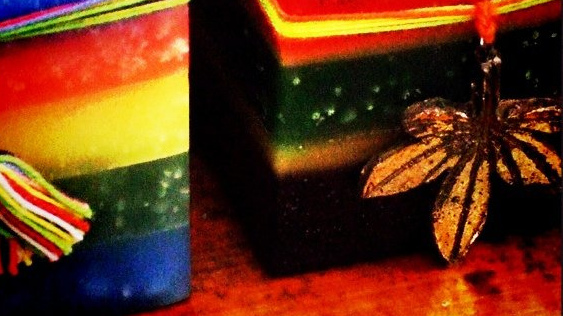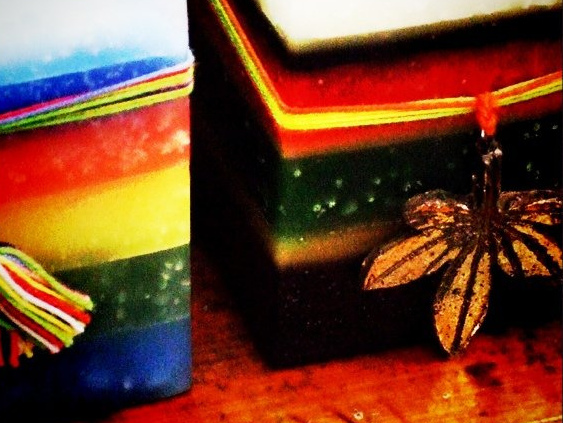
A small but growing group of Americans say that despite being granted religious freedoms under the First Amendment of the U.S. Constitution, they are being religiously persecuted because they use a Schedule I substance to enhance their spiritual awareness: marijuana.
Though touted as a medicinal miracle and a safer way to unwind after a hard day’s work, some religious groups view marijuana as a spiritual healer or even a sacrament. While religious groups can obtain an exemption to use certain an illegal substances, there is no state or group in the U.S. that has been granted an exemption to use marijuana.
Modern use of marijuana for religious purposes is most associated with the Jamaican-born Rastafari movement, but the first recorded use of marijuana in a religious setting dates all the way back to the second millenium B.C.E. In addition to Rastafari, other religious groups that have used marijuana or viewed the substance as a sacrament include the ancient Chinese groups, ancient Germanic pagans and Hindus.
K.H., a practicing Rastafarian with a background in religious studies who asked to have his name withheld, said he uses marijuana to try to “commune with the internal and external divinity.”
Similarly, Spirit Leaf, a spiritual cannabis user who asked to have his identity protected, said he uses marijuana for spiritual purposes because it makes him reverent. “When I use it, it makes me want to give thanks and be appreciative of the gift and of all the other gifts, like the air we’re sharing in the room, the table, the coffee, the coffee cup,” he said.
As Mint Press News previously reported, the Minnesota Court of Appeals ruled last month that a teenager who identifies himself as a practicing Rastafarian should not have been found guilty of possessing drug paraphernalia by a lower court, especially since the pipe is in no way detrimental to the public’s safety. By ruling the way they did, the court decided religious use of marijuana is a valid defense for a marijuana criminal charge.
This was an especially celebrated win for spiritual marijuana users like Rastafarians, since marijuana and related devices used to consume the substance such as pipes are seen as accoutrements no different from a rosary, cross or chalice Christians drink wine out of.
“It’s no different than a Sikh kirpan dagger,” said Ras J., a licensed Rasta minister, who asked Mint Press News to protect his identity. “What is more threatening, a dagger or a glass pipe? This is the crap we’re dealing with.”
K.H. said he testified as an expert witness on behalf of the Rastafari teen because “he was a friend of mine’s son who was put in a position that I saw was an injustice.”
“I knew the truth about the story,” he said, adding that the court of law ought to hear what that is.
Before this case, there was another historic case in 2011, in which Jamison Arend, a licensed Rasta minister, was granted exemption from being tested for drugs while on probation, since the judge ruled testing a spiritual marijuana user for drugs was setting that person up to fail.
Many marijuana legalization advocates referred to Arend’s win as one of the first religious exemptions in the U.S., and said there are a number of people serving prison sentences because they were unsuccessful in their claims that they used the substance for religious or spiritual use.
One of the biggest frustrations for spiritual marijuana users is the claim that spiritual use is a ruse. Spirit Leaf said the biggest misconception about spiritual marijuana use is “that it’s a joke.”
“It’s very important for people at large to understand that for those who think in these terms it’s not a joke, it’s not laughable. It’s as personal and essential to the core of one’s life as you can get,” he said. “When the government comes down and takes away Bibles, how would people feel? Or take the Eucharist away? They would feel strongly.”
Ras J. agreed and added that he feels frustrated by those who think spiritual users claim they use marijuana for spiritual purposes as a ruse or an excuse to smoke weed. But, he says, “Think about what you’re saying for a minute. Why would I go through all of this? I can do if I wanted to anyway.”
Religious freedom
Carl Olsen is one of the most well-known members of the Rastafari faith in the U.S. and has challenged the courts to legally recognize religious use of marijuana since the 1970s. Unfortunately, says Olsen, “All my cases were decided against me.” Despite having “no actual proof of harm or evidence” that Olsen had injured anyone by using marijuana, Olsen says that possessing marijuana was enough to make him a criminal — and bad person — in the eyes of the law and the general public.
While Olsen and many Rastafarians have yet to find mass success in the legal system, Olsen says his legal troubles began because he was “operating under the assumption that what I was doing was constitutionally protected.”
He pointed to a 1990 Supreme Court case — Employment Division v. Smith — in which Native Americans in Oregon sued after being denied unemployment benefits after testing positive for illegal substances, specifically the hallucinogen peyote.
The respondents argued peyote is seen by Native Americans as a sacrament and therefore its use should be protected under the First Amendment. However Olsen says the state argued that if the use of peyote was not allowed for any use, the respondents were not discriminated against because the State of Oregon did not recognize any legal use of peyote.
Unlike marijuana — which is legal in more than 20 states for medical purposes — the U.S. government allows members of the Native American Church to use peyote for religious ceremonies.
Pointing to the federal government’s own medical marijuana program, Olsen says he thought that the court’s decision to rule in favor of this equal protection argument meant that it wouldn’t be long before spiritual use of marijuana would be legal since medical use was partially legal. But so far, nothing.
Ras J. said that since medicinal use of marijuana is not protected under the Constitution but religious use is, spiritual users in states that have legalized medical marijuana have a valid defense if they were to have a run-in with law enforcement.
He added that while not every recreational marijuana user may know it, every person who consumes marijuana is doing so for a spiritual reason.
Raised in a Lutheran family, Ras J., a self-described “hockey brat” from White Bear Lake, Minn., said the Rasta teachings found him. While Ras J. has the same goal as medical marijuana advocates, which is to legalize the substance, he says he doesn’t fight for medicinal legalization because he believes marijuana should be used more for religious purposes, but adds it “doesn’t matter who wins first.”
“It’s really sad to go through all of this for some herb. Anyone in their right mind knows this is as stupid as a fight as it gets. No one has died from it,” he said, before explaining that the human body is made up of cannabinoid receptors — not alcohol or caffeine receptors — and marijuana is the most potent form of cannabinoids on Earth.
Olsen, however, has put a lot of energy into efforts to legalize medical marijuana, reasoning that the more the public looks at the marijuana plant and sees it’s not killing people — in other words, there is no health threat associated with marijuana — use of the plant will become more and more acceptable.
Healing herb
While Olsen used marijuana daily for 20 years — during which time he says he felt healthier — he says he eventually decided to stop using the sacramental herb due to the challenges associated with numerous and frequent marijuana arrests, such as losing his job.
But Olsen says he paid a spiritual price for not receiving his sacrament. “It’s like a death sentence,” he said. “I’ve suffered an injury for an unjustified persecution. God revealed [marijuana] to me and I took a stand on it.”
Identifying himself as a universalist, Spirit Leaf said that for spiritual users, marijuana is a healer and provider that is referenced numerous times in the Bible, since the hemp stalk of the marijuana plant can be used to make clothes, or clothe the naked, build houses and the marijuana plant itself can heal the sick. He said the nature of the plant is that very provision, adding “I think it teaches people to think in universal terms.”
He added that the government would probably not take away the Native Americans right to use peyote since it is essential to who they are. “Who has anything to say about that in the first place. Who is this government?,” he said. “They are supposed to represent the people.”
Ras J. expressed his disappointment in how much the government has “lied” to the people about the dangers of marijuana. “I would hope people would be smarter than that,” he said, adding legalization is not just about his religious freedom anymore, but is about people’s health and the environment.
Spirit Leaf agreed and said the 1936 film “Reefer Madness” is a “farce” everyone should see, so they understand all of the propaganda and misinformation that has proliferated about marijuana.
Ras J. argued one of the main reason’s the government doesn’t want people to have access to marijuana is “not because a person’s brain cells are gonna die or anything else in their propaganda machine,” but it’s because people are not going to take the government’s “crap” anymore, and that is the big problem.
“We’ll become a lot less malleable as a whole,” he said, explaining that he thinks the government uses religion to give society structure. But since the Rastafari faith doesn’t have structure like other religions, Ras J. suspects that the faith is concerning to politicians. “You can’t put us in a box,” he said.
K.H. agreed and said that because people can’t just Google the Rastafari faith in order to understand it, they see the religion as a sham. He added that since “Rastas don’t have any belief that a certain physical place is a temple of worship,” but instead everyone’s own body is the temple of Jah (the Rasta word for God), there is no physical, concrete place members of the general public can go to better understand the religion.
Despite a lack of awareness regarding spiritual use of marijuana, Olsen predicts that marijuana will soon be legalized for any use because “the minute you ask about religion you are in territory where you have no business.”
“Religion is a personal thing,” he said. “You have to be sinless to join the Catholic Church. If you’re a sinner, you’re out. But the Bible says we all sin, so why do we have sincerity tests by the courts?” Courts, Olsen claims, are filled with Christians and Jews — not Rastafarians or atheists.
For those who think they are removed from this current infringement upon spiritual marijuana user’s religious rights, Ras J. argues that everyone is affected. He said the “whole world was founded” by believers of the big three religions: Muslims, Christians, and Jews, and said “religions affect everyone.”
He added that people of all faiths should stand up and advocate for spiritual marijuana users First Amendment rights because you never know whose rights the government will try to limit next.


